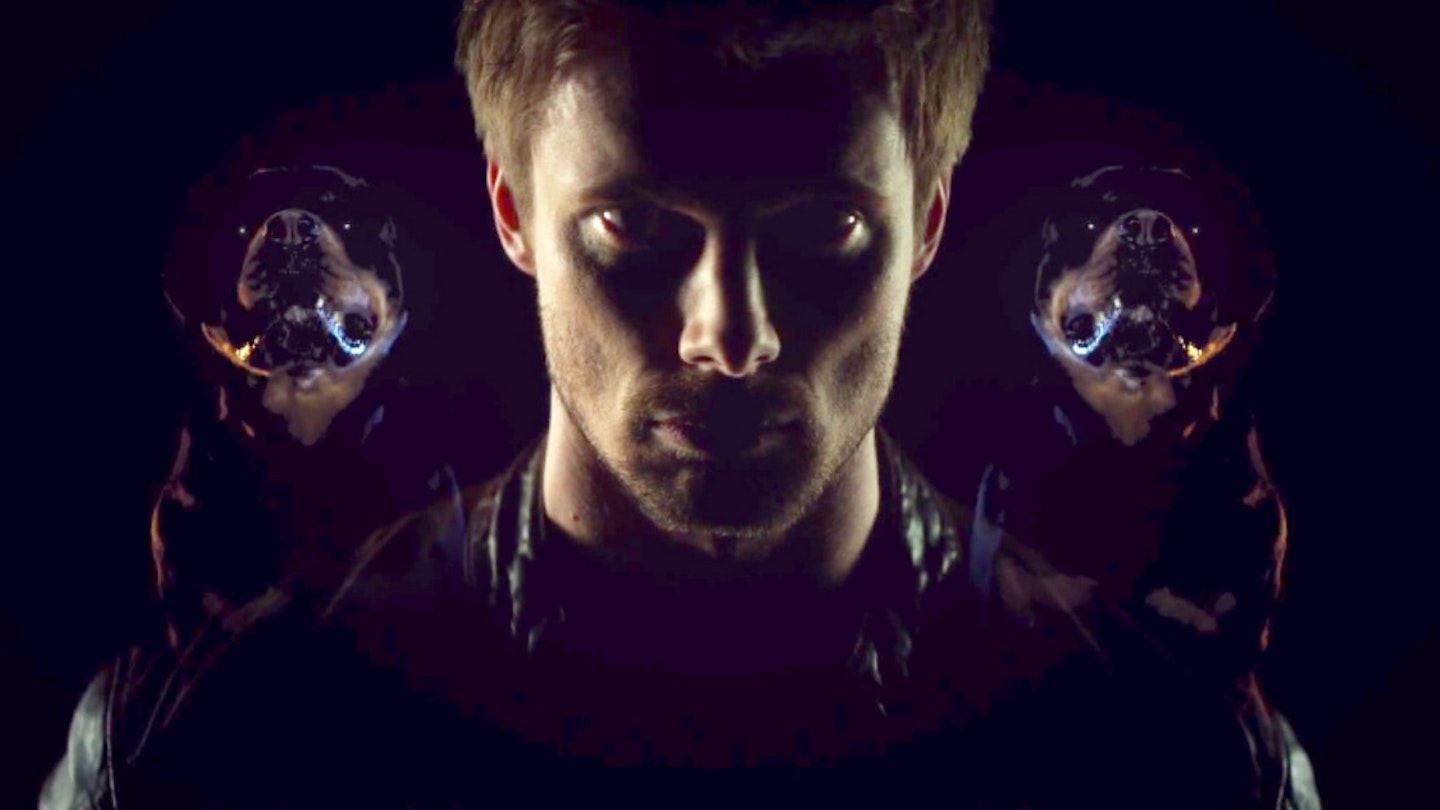If Bradley James found governing Camelot tough, his stress levels must be through the roof as he leads us toward Armageddon.
Okay, maybe we're foisting too much pressure on the 32-year-old Brit, an affable enough fellow who would seem to have humanity's overall well being in mind, but, you know, he is the Antichrist. Or at least he plays one on TV.
First gaining popular acclaim co-starring as Arthur Pendragon in Merlin before going on to a recurring role in iZombie, he now finds himself center stage in the title role of Damien, the series developed by [Glen Mazzara](http://
www.empireonline.com/people/glen-mazzara) of The Shield and The Walking Dead.
A sequel to Richard Donner's 1976 horror classic The Omen, Damien effectively ignores the big screen follow-ups Damien: Omen II (1978) and Omen III: The Final Conflict (1981) and, instead, picks up 25 years later with Damien Thorn, a photo journalist who has built a career covering human suffering around the world, somehow coming away from it all physically unscathed. But on his 30th birthday he's approached by the mysterious Ann Rutledge (Barbara Hershey), who begins to make him aware of his true identity as "The Beast", AKA the Antichrist. What follows is Damien's desperate attempt to hold on to his humanity despite the efforts of various factions who either want to destroy him or help him embrace his destiny.
In the following exclusive interview, James reflects on what drew him to the project and Damien's evolution over the course of this first 10-episode season.
What was it about Damien that drew you to the project?
I keep saying that Glen Mazzara has a very warped mind. but it's also a very honest mind. It's not warped for the sake of being weird, it's just honest in weird situations. I liked the fact that he'd written a great deal of humanity to this character who wasn't just sort of a cut and dry, "This guy's the Antichrist and therefore he's bad." He'd written all these different colors to this character, and when I met Glen I realized he was a true collaborator. That can be a bit of a rarity, certainly to the degree he takes it. It was a very enjoyable experience.
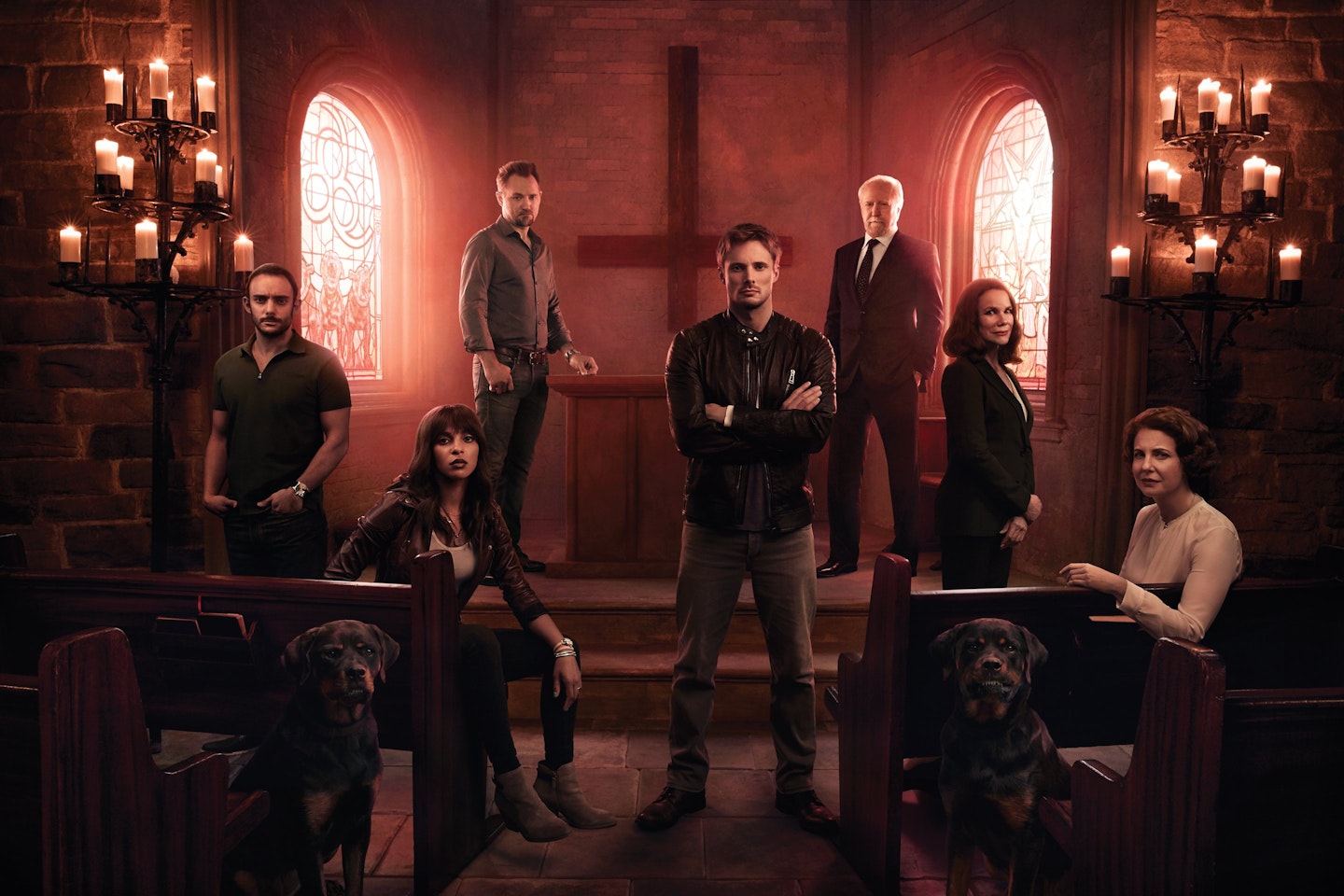
You mentioned Damien's humanity. I've seen the first five episodes and in the first few, things remain fairly enigmatic. But when you get to the fifth episode, where Damien is connecting with a war vet who wants to die, it shone a spotlight on that humanity in a way that was different from the episodes that preceded it.
Alex McCooeye, who played the war vet, is an actor Glen had in his back pocket to work with. Once he got on set, you could see why. In terms of the script, it was one of the best things I've ever read. It was a very exciting script that put Damien in a position where he'd have to make a decision on whether or not to help this guy kill himself. As a result, I think the audience will probably find themselves sort of sympathizing with the Antichrist, which is probably not something they expected to do.
The other interesting thing is that for those first few episodes, Damien comes across as something of a victim of his circumstances. Sort of, "Why me? Why do I have to be the Antichrist?" But there is one moment when a cop threatens him and in response Damien suddenly comes back from a position of strength, projecting real power as he not so subtly threatens the cop and gets him to back down.
There's a lot of examples today in the world of people getting a voice and suddenly feeling they have power, and social media is a huge part of that venue. You see that they don't quite have a refined quality with it, quite often, because they're not used to it and they don't know how to properly harness that thing. With Damien, there's still very rough edges around how to use that voice, but, again, it's part of that discovery for him. It's not so much that at that point he's in acceptance of what he is, but it's the same as being backed into a corner. He's obviously not afraid to use it when it suits him.
In terms of being a victim of circumstance, I think that's a very good way of putting it, because I compare Damien to you and I, to your everyday man, in the sense of that humanity in him. He makes good and bad choices, as we all do. He has good and evil within him, as we all do. His baggage just happens to include the fact that he's the Antichrist.
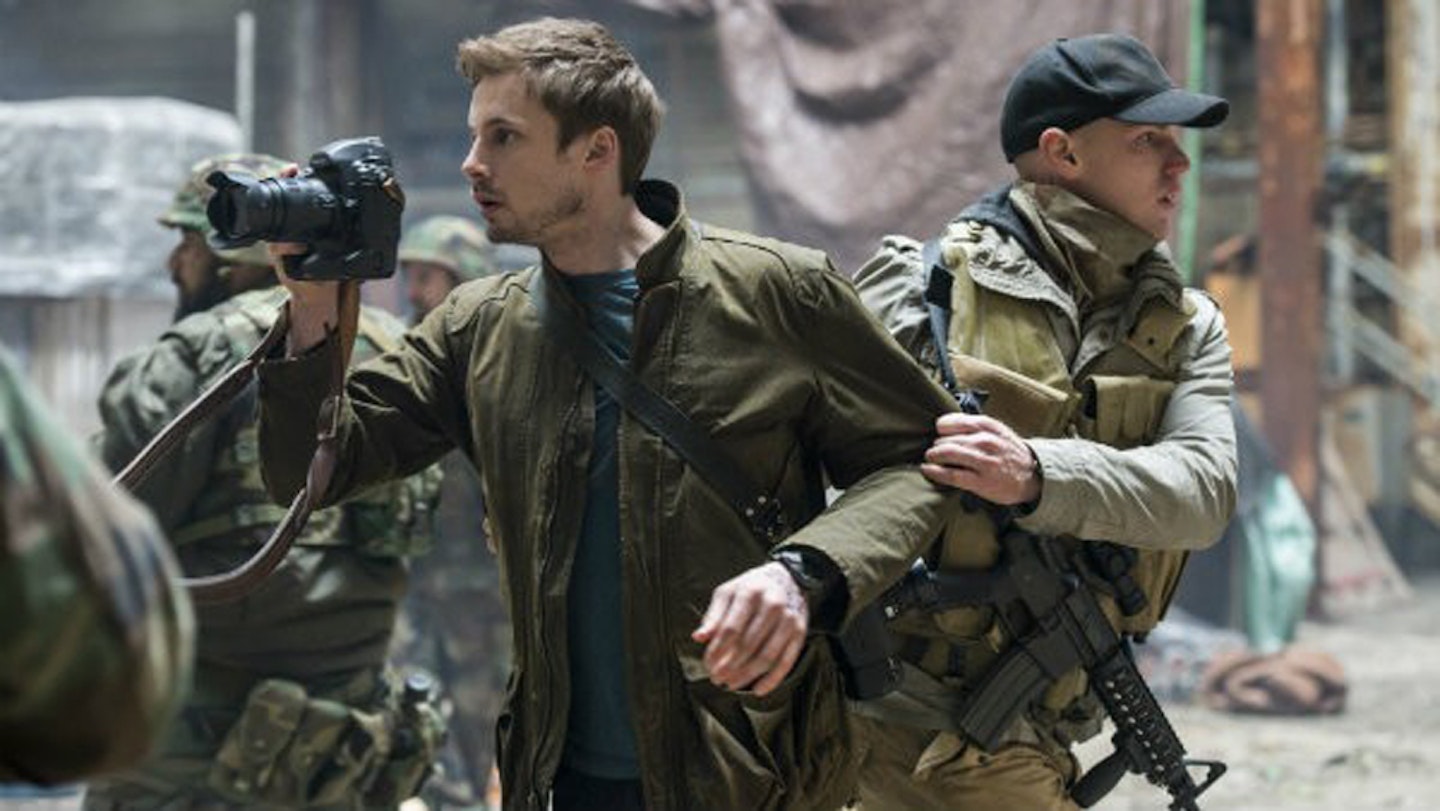
That's some baggage. How would you describe Damien's arc over the course of the first season?
When we meet him, he's aware that there's something about him that's different without being able to articulate what that is. He's lived his life on the run from it, but he's at the point where he can no longer outrun it; things are becoming too loud. He's surrounded himself with the noise of pain as a world-traveling photographer. That pain follows him around and it has gotten to a point where the noise can no longer be drowned out.
It's difficult to comprehend that information in the course of ten minutes. Someone tells you what's going on, you're not going to turn around and go, "Oh, that explains it. Okay, yes, I'm the Antichrist." You're not going to have that relaxed an acceptance of it, I don't think. Certainly not if you've been living a relatively sort of humane life up until that point. That transition is one that takes place over time. It's not different levels of acceptance, but I guess if you look at an Alcoholics Anonymous program, there's different steps to it. There's denial, there's anger, there's all sorts of different reactions you have to go through so that eventually you do have a level of acceptance with it. Different things happen to Damien which make him believe, but along the way you've got his own mind trying to comprehend it all. The journey is very much about that comprehension of his status and his role in the world.
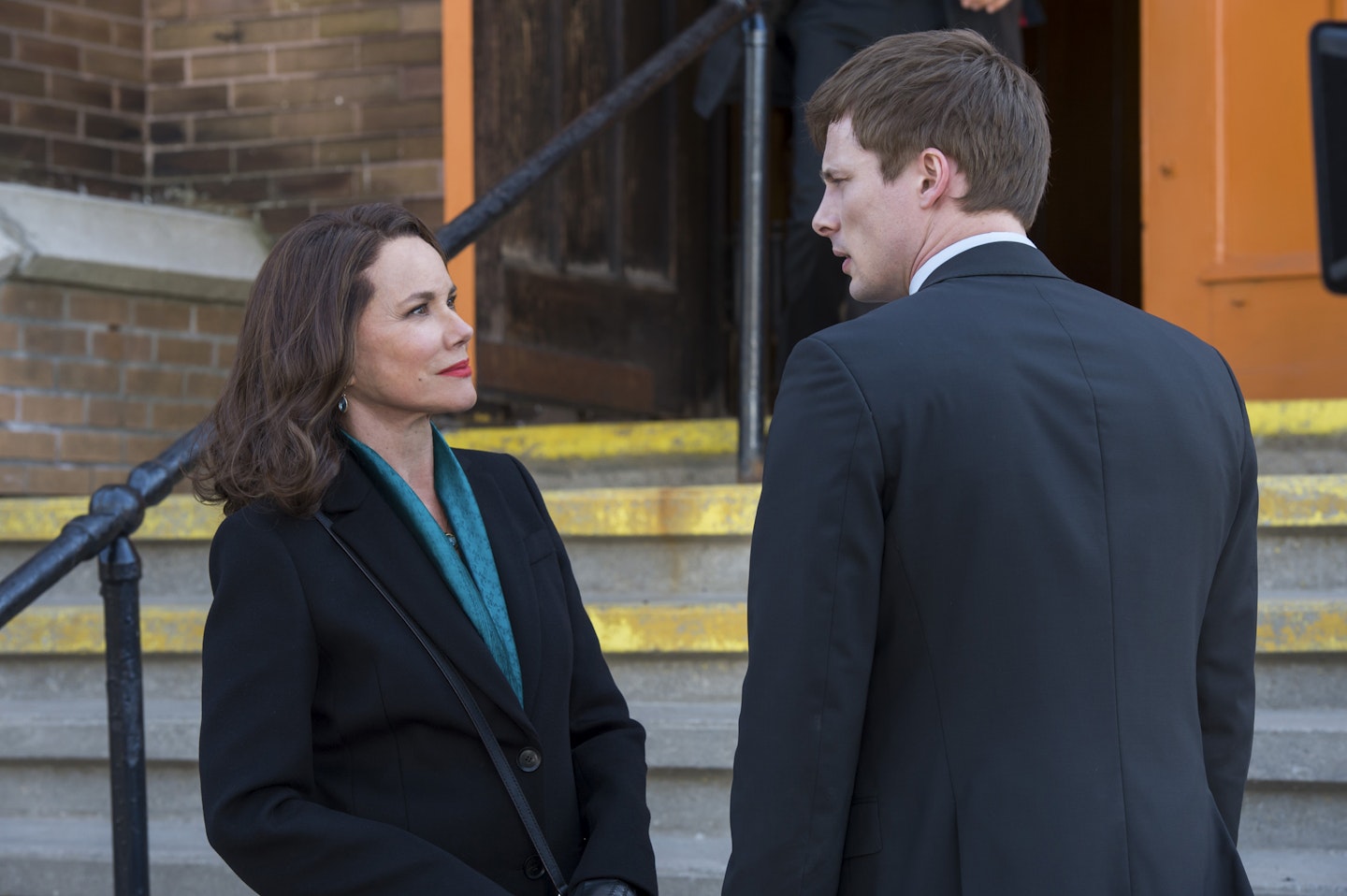
But as he becomes more accepting of what's going on around him, does it then become tougher for Damien to retain that inner humanity?
That's the fight. When you alluded to the conversation with Detective Shay in episode four, that's a little sneak peak of him not letting go of his humanity, but of him testing out the waters of this newfound power or newfound information. That can only build as the pressure builds, because people are coming out of the woodwork now and expecting things from him. And there's not always a human way of getting out of things. Not in Damien's case, anyway.
One of the things that intrigued me about the intent of the original Omen films, if not necessarily the execution, was the idea of watching Damien Thorn age and gradually move closer to the seat of power, and the way that that leads to Armageddon.
Glen, again, has been very clear in terms of just taking his source material from the first film, so that's given us 25 years of back story that we have been able to fill in and play with and create. Then, in terms of the final destination, I guess it's just not as black and white as one may think. Being the Antichrist doesn't mean turning into a devil with horns and turning the Earth into molten lava and fire and brimstone and what have you.
Glen has very much dipped the show in reality and The Omen sort of manages to bring a level of reality. That's why it messes with your mind so much, because it's not very hocus pocus. It's creepy. Your mind does a lot of the work in terms of creating that fear factor that you have, which is what Damien has ingrained itself in as well.
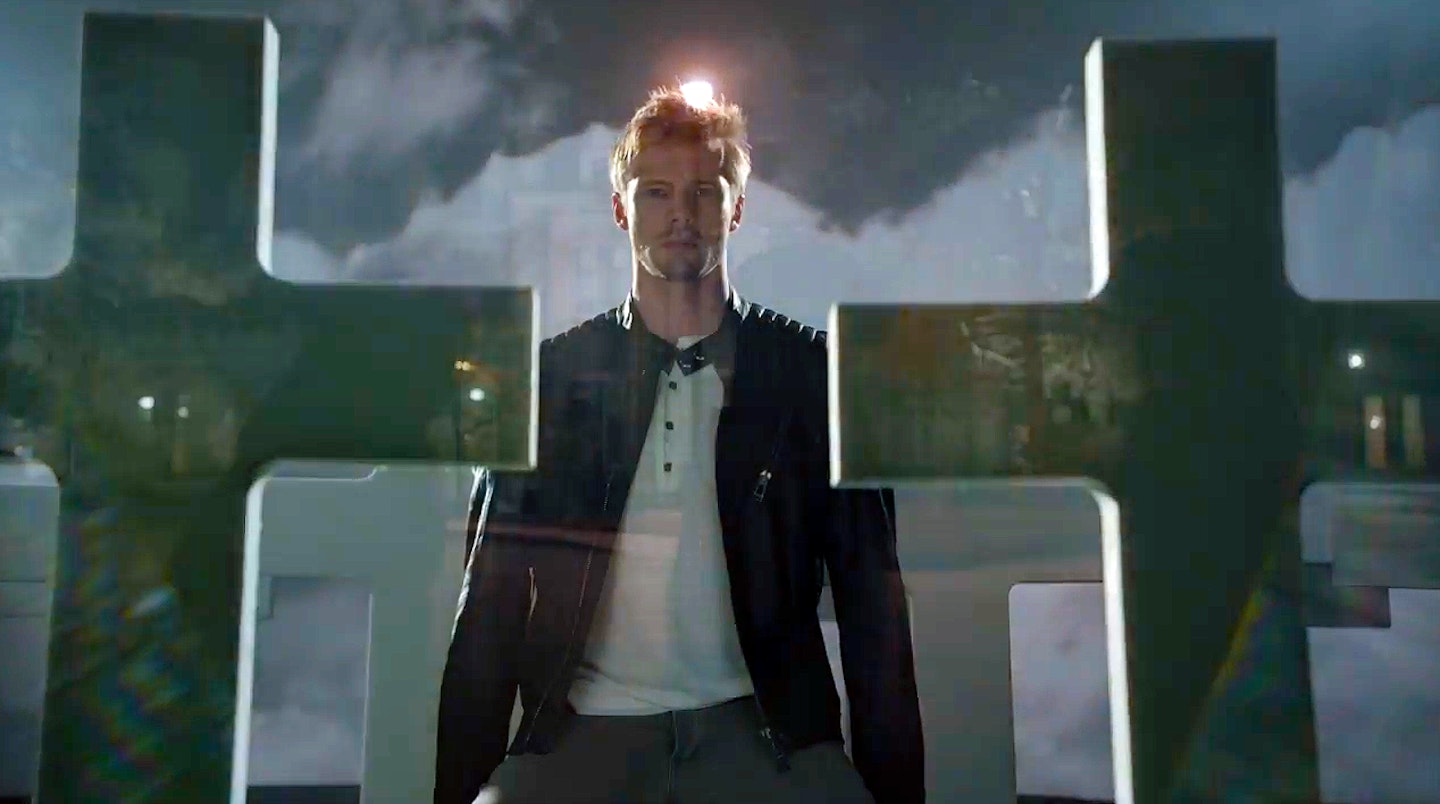
As strange an analogy as this might be, it reminds me of a darker version of Smallville. On that show we watched Clark Kent's gradual evolution into Superman.
But with Superman as an example, you put on a blue suit with a cape and that's who Superman is. For Damien, I don't think there's a defining moment where he goes, "Oh, now I'm the Antichrist." It's more a build, as life tends to be. You don't reach a goal in your life and then stop. Things change. Things are constantly changing, and constantly on the move, and we get to witness that growth of power and the handling of that power. There's something very alluring about the story of how he gets there and how that happens in a truthful way.
